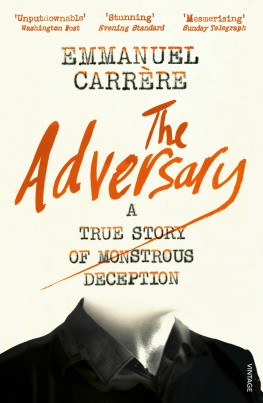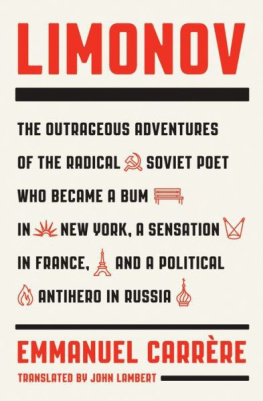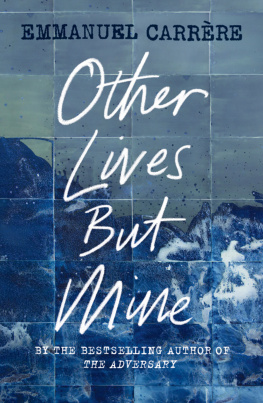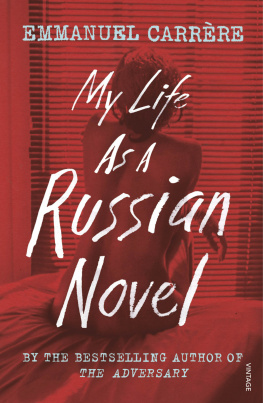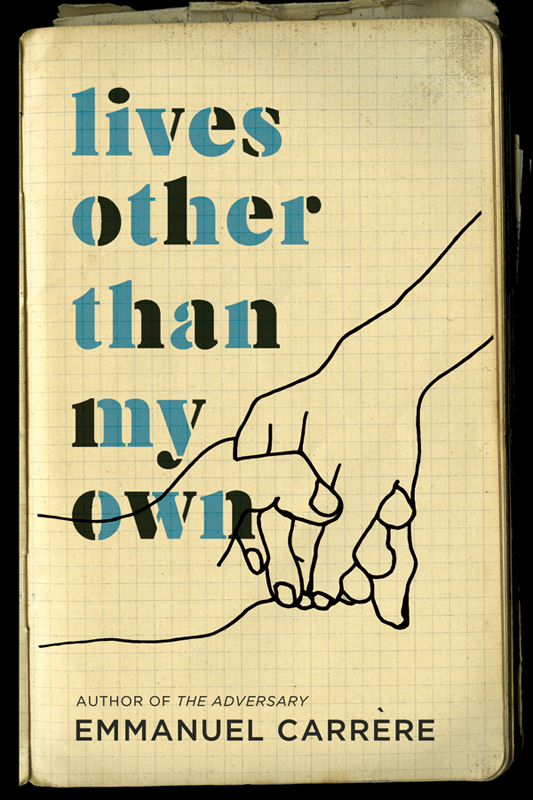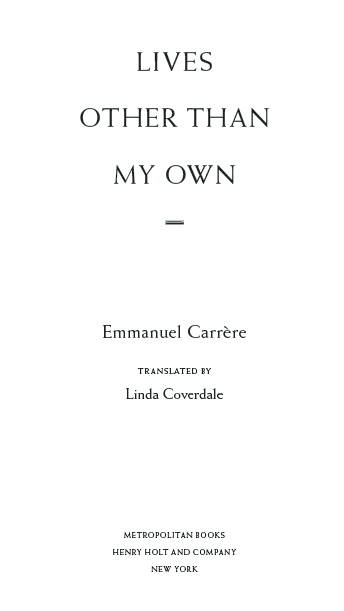
Contents
The night before the wave, I remember that Hlne and I talked about separating. It wouldnt be complicated; we didnt live together, hadnt had a child, and were even able to see ourselves remaining friends, and yet, it was sad. It was Christmas 2004. Here we were in our bungalow at the Hotel Eva Lanka, and we couldnt help remembering a different night, just after wed met, a night wed spent marveling that we had found each other and would never part, and would grow old together, happy for the rest of our lives. We even talked about having a child, a little girl. We did have that little girl in the end, and we still trust that well live out our days together. We like to think we always knew that everything would work out. But after the dazzling confidence of love at first sight came a complex, chaotic year, and what had at first seemed so certain to us (and still seems so now) no longer appeared at all certain or even desirable on that Christmas in 2004. On the contrary, we were convinced that this vacation would be our last together and that, for all our good intentions, the trip had been a mistake. Lying side by side, we couldnt bring ourselves to mention that first night and the promising future we had longed for so fervently yet seemed somehow to have lost. We were simply watching ourselves draw apart, without hostility, but with regret. It was too bad. For the umpteenth time I spoke of my inability to love, all the more remarkable in that Hlne is truly worthy of love. While I was telling myself that I would have to grow old alone, Hlne had something else to worry about: just before our departure, her sister Juliette had been hospitalized with a pulmonary embolism, and Hlne was afraid Juliette might be seriously ill or even dying. Although I insisted such fears were irrational, Hlne could not shake them off, and I resented how she had let herself become absorbed in something that excluded me. She went out on the terrace to smoke a cigarette. I waited for her, lying on the bed and thinking, If she comes back soon, if we make love, then perhaps we wont separate, perhaps we will grow old together after all. But she did not come back. She remained alone on the terrace watching the sky gradually grow lighter, listening to the birds begin to sing, and I fell asleep on my side of the bed, sad, lonely, convinced that my life could only get worse and worse.
* * *
Hlne and her son, I and mine: all four of us had signed up for a scuba lesson at the dive club in the neighboring village. Since the last session, however, my Jean-Baptiste had developed an earache and didnt want to go anymore. Tired from our almost sleepless night, Hlne and I decided to cancel the lesson. Rodrigue, the only one whod really wanted to go diving, was disappointed. You can always go swimming in the pool, Hlne told him. Well, hed had it up to here with swimming in the pool. He would have at least liked for someone to accompany him down to the beach below the hotel, where he wasnt allowed to go alone because of the dangerous currents, but no one wanted to go with him, neither his mother nor I, nor Jean-Baptiste, who preferred to read in the boys bungalow. Jean-Baptiste was thirteen at the time. I had more or less forced this exotic vacation on him, a holiday with a woman he hardly knew and a boy much younger than he was, and hed been bored from the moment we arrived, which he made clear to us by staying off on his own. Whenever I asked him irritably whether he wasnt happy to be here in Sri Lanka, he replied grudgingly that yes, yes, he was happy, but it was too hot and actually he was happiest in the bungalow, reading or playing his Game Boy. In short, he was a typical adolescent, while I was a typical father of an adolescent, catching myself telling him the same exasperating things my own parents had said to me when I was his age: You ought to go out, look around Whats the point of bringing you all this way? Like talking to a wall. So Jean-Baptiste retreated into his lair while Rodrigue, left on his own, began bothering Hlne, who was trying to nap on a deck chair by the huge saltwater pool, where an elderly but incredibly athletic German woman who resembled Leni Riefenstahl swam every morning for two hours. As for me, still feeling sorry for myself over my inability to love, I went to hang out with the Ayurvedics, as we called the group of Swiss German guests who were staying in some nearby bungalows. They had come to the resort to follow a program of yoga and traditional Indian massage. They werent meeting in plenary session with their master, so I performed a few asanas with them. Then I wandered back to the pool, where the last breakfast dishes had been cleared and tables were being set for lunch. Soon the tedious question would arise: What should we do that afternoon? In the three days since our arrival we had already visited the forest temple, fed the little monkeys, and seen the reclining Buddhas. So unless we undertook more ambitious cultural excursions, which none of us found tempting, we had exhausted the attractions in our immediate vicinity. Some tourists can spend days in a fishing village rhapsodizing over everything the locals dogoing to market, mending nets, social rituals of all kindsand I reproached myself for not being like that, for not having passed on to my sons the generous curiosity, the acuity of observation I admire in people like Nicolas Bouvier, the Swiss traveler and writer. Id brought along The Scorpion-Fish , Bouviers account of a year he spent in Galle, a large fortified town about thirty kilometers to the east of us along the southern coast of the island. Unlike his most famous book, The Way of the World , a tale of celebration and wonder, The Scorpion-Fish describes collapse, loss, and a descent into the abyss. It presents Sri Lanka as a form of enchantment, but in the perilous sense of the word, not some guidebook come-on for newlyweds and hip backpackers. Bouvier almost lost his mind there, and our visit, whether considered as a honeymoon or a rite of passage for a future blended family, was a failure. And a feeble failure at that, with no bang, only a whimper. I was growing anxious to go home. Crossing the trellised lobby invaded by bougainvilleas, I ran into a frustrated hotel guest who couldnt send a fax because the power was out. At the reception desk hed heard thered been an accident, some problem in the village, but he hadnt understood exactly what was wrong and just hoped the power would come back on soon, because his fax was very important. I rejoined Hlne, who was awake now and told me something strange was happening.
* * *
The next scene: a small gathering of guests and staff on a terrace at the end of the hotel grounds, looking out over the ocean. Curiously enough, nothing seems amiss at first. Everything appears normal. Then you start to notice how strange things really are. The water seems so far away Normally, there are about twenty yards of beach between the oceans edge and the foot of the cliff. Now, however, the sand stretches off into the distance: flat, gray, glistening in the hazy sunshine, like Mont-Saint-Michel at low tide. Then you realize that the sand is littered with objects, but you cant tell what size they are. That piece of twisted wood, is it a broken branch or a whole tree? A really big tree? That crumpled boat, perhaps thats something a bit bigger, maybe an honest-to-god trawler, shattered and tossed aside like a nutshell? There is no sound; no breath of air rustles the fronds of the coconut palms. I dont remember the first words spoken in the group wed joined, but at one point someone murmured in English, Two hundred children died in the village school .


